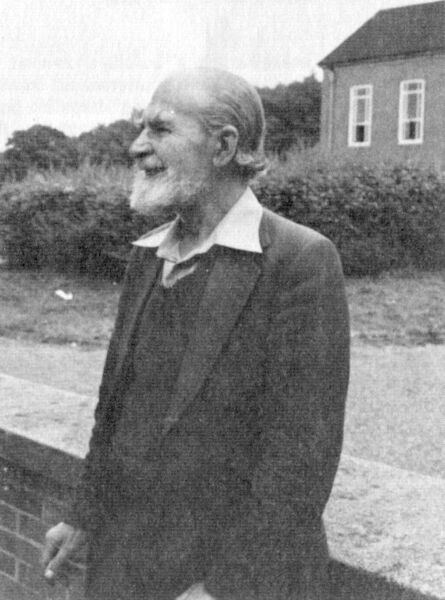Basil Bunting (Basil Bunting)

Born into a Quaker family in Scotswood-on-Tyne, Northumberland, Basil Bunting studied at two Quaker schools: from 1912 to 1916 at Ackworth School in the West Riding of Yorkshire and from 1916 to 1918 at Leighton Park School in Berkshire. His Quaker education strongly influenced his pacifist opposition to the First World War, and in 1918 he was arrested as a conscientious objector having been refused recognition by the tribunals and refusing to comply with a notice of call-up. Handed over to the military, he was court-martialled for refusing to obey orders, and served a sentence of more than a year in Wormwood Scrubs and Winchester prisons. Bunting’s friend Louis Zukofsky described him as a “conservative/anti-fascist/imperialist”, though Bunting himself listed the major influences on his artistic and personal outlook somewhat differently as “Jails and the sea, Quaker mysticism and socialist politics, a lasting unlucky passion, the slums of Lambeth and Hoxton …” These events were to have an important role in his first major poem, “Villon” (1925). “Villon” was one of a rather rare set of complex structured poems that Bunting labelled “sonatas,” thus underlining the sonic qualities of his verse and recalling his love of music. Other “sonatas” include “Attis: or, Something Missing,” “Aus Dem Zweiten Reich,” “The Well of Lycopolis,” “The Spoils” and, finally, “Briggflatts.” After his release from prison in 1919, traumatised by the time spent there, Bunting went to London, where he enrolled in the London School of Economics, and had his first contacts with journalists, social activists and Bohemia. Bunting was introduced to the works of Ezra Pound by Nina Hamnett who lent him a copy of Homage to Sextus Propertius. The glamour of the cosmopolitan modernist examples of Nina Hamnett and Mina Loy seems to have influenced Bunting in his later move from London to Paris.
After travelling in Northern Europe, Bunting left the London School of Economics without a degree and went to France. There, in 1923, Basil Bunting became friendly with Ezra Pound, who years later would dedicate his Guide to Kulchur (1938) to both Bunting and Louis Zukofsky, “strugglers in the desert”.[citation needed] Between February and October 1927, Bunting wrote articles and reviews for The Outlook, and then became its music critic until the magazine ceased publication in 1928. Bunting’s poetry began to show the influence of the friendship with Pound, whom he visited in Rapallo, Italy, and later settled there with his family from 1931 to 1933. He was published in the Objectivist issue of Poetry magazine, in the Objectivist Anthology, and in Pound’s Active Anthology. During the Second World War, Bunting served in British Military Intelligence in Persia. After the war, he continued to serve on the British Embassy staff in Tehran until he was expelled by Muhammad Mussadegh in 1952. Back in Newcastle, he worked as a journalist on the Evening Chronicle until his rediscovery during the 1960s by young poets, notably Tom Pickard and Jonathan Williams, who were interested in working in the modernist tradition. In 1965, he published his major long poem, Briggflatts, named for the Quaker meeting house in Cumbria where he is now buried. In later life he published Advice to Young Poets, beginning “I SUGGEST / 1. Compose aloud; poetry is a sound.” Basil Bunting died in 1985 in Hexham, Northumberland. The Basil Bunting Poetry Award and Young Person’s Prize, administered by Newcastle University, are open internationally to any poet writing in English.
Born
- March, 01, 1900
- United Kingdom
- Scotswood-on-Tyne, Northumberland, England
Died
- April, 04, 1985
- United Kingdom
- Hexham, Northumberland, England
Cemetery
- Quaker Graveyard
- Brigflatts, Cumbria, England
- United Kingdom


